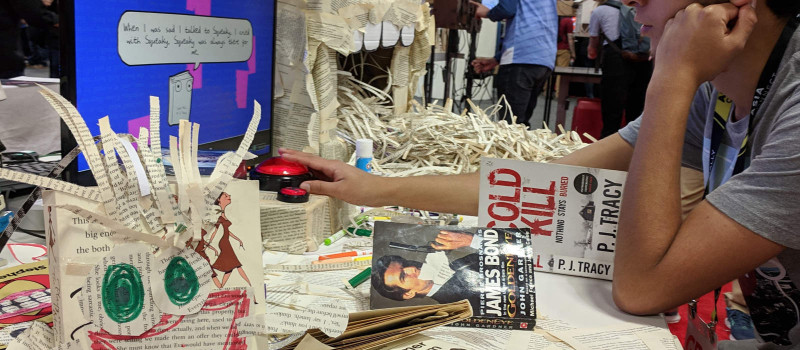The Book Ritual
You can’t play The Book Ritual without a real-world book. It doesn’t have to be your favourite book. It doesn’t even have to be a good one. The only thing that matters is that it has pages you can ruin and tear out.
You see, instead of clicking your mouse to continue the conversation with the book in the game, the only way to progress the story is to feed it a page from your own book through a shredder. Told you it didn’t have to be your favourite book!
The idea behind this is simple: in order for the book to open up to you, you have to open up to the book. So before you feed it a page, the game will ask you to write in it, sully its pages with creativity exercises, so the book understands where you’re coming from.
Destroying something you’ve attributed some kind of value to teaches players how to deal with loss and accept grief. Tearing up a book allows players to experience the feelings of loss and examine the emotions that arise. The mountain scraps of shredded paper are a silent reminder of that process.
About the developer
The Book Ritual is the latest art installation by UK based artist Alistair Aitcheson. He’s also the creative mind behind the playable performance The Incredible Playable Show, and co-hosts Beyond Screens: Alternative Controller Show on Twitch.

Interview with Alistair Aitcheson
COVID hasn’t been kind to events. Did the pandemic impact development of The Book Ritual?
I made the game in 2018 and took it out to a lot of events in that year and the next. Then, obviously, 2020 came around and that dried up for a bit. At that point I was happy to consider it a finished piece. I didn’t have anything planned to add, but whenever there’s an opportunity to exhibit it somewhere, I gladly take it. If a piece like this isn’t on display it kind of ceases to exist.
It does seem like a difficult game to bring to an exhibition because it feels a bit like therapy. That’s not what most people are looking for when they visit a game fair.
Everyone seems to approach it differently. The way I wrote it was with the expectation that most people will not have longer than 10 to 15 minutes to spend with it. The complete game is about two hours, so I wrote the first chapter to be a neat microcosm of the whole story. It should welcome the players in, it should ask them to reflect on something important, and they should get the opportunity to do something creative with that. If you just play the first chapter, you should walk away having had a meaningful experience.
I’ve seen people play it all the way through at quieter exhibitions, where they feel that they’re in a safe enough space to do so. I can totally understand why people wouldn’t want to sit down with something so personal, and which is asking such personal stuff from them, in a public space. I think part of my role as a game designer is to create a space where people do feel safe. I don’t want the game to look like it’s trying to drain stuff from them, to make them open up more than they want to. It should be an invitation to explore your feelings, not a demand.
You can play the game with any book, but do you think the experience is more powerful when you use a book you really love?
It definitely changes the experience, but I don’t want to say to people: “use your most beloved book!” If the experience doesn’t live up to what it’s meant to be, then you’ve just gone and trashed your favorite book for nothing. I wouldn’t want to be responsible for that! I like to take it from the perspective of “you take the book you’re comfortable with”. One of my favorite things is when people take a book that they don’t care much about - a manual for Windows 95 or something - and by the end of the experience they’ve turned it into something they want to keep. They’ve turned it into something that they want as a souvenir because they’ve given it a personality, they shared all their secrets with it. So they can look upon this thing they were going to throw out and see it as a friend. I think the important thing is to be open to how people want to experience it, whether they want to play it with the closest book to hand or a book that they’ve specifically brought. If you start dictating what they need to do, have instructions about what they need to bring and share, you start to dismantle that important safe space.
How do people generally respond to it?
Some people play it, they tear some pages out, they write a couple of things in the book and go “well that’s novel”, but you feel it didn’t connect on a deeper level with them. That’s okay. Then you also get people for whom it did connect on an emotional level and the ways people respond to that really vary. Some people come up to me and they will want to talk about their experiences – in the game or from life. Some people come away and you get the feeling like they need some space. It’s like a debrief, and when I’m present I take on this role as the person who makes sure that debrief happens. If you need to talk to someone, I’m available to listen. If you want to be on your own, I can make sure no-one disturbs you.
Isn’t that emotionally draining?
I’m not looking at what people are writing, so I’m just hanging around – it’s up to the players how much they want to expose to me personally. There have been some instances where I had to make it clear that I didn’t feel comfortable discussing specific topics. That can be difficult. The Book Ritual is based on my personal experiences but the specifics are changed for the story. Sometimes people have asked about real-world specifics I’m not comfortable sharing and I’ve needed to know where my own boundaries are. But they’re not asking out of malice – they connected to the game and want to know more about its origins. So it’s enough to say “I’m sorry, I don’t want to go into that” and people will understand. People know that grief is a sensitive subject.
Apart from those feelings, were there any other specific inspirations behind creating The Book Ritual?
The feelings that I was feeling that I was struggling to express and talk about and what led me to make The Book Ritual… this was not the first game I’ve made where I tried to talk about them. None of them felt like comfortable experiences – it was like I was sitting a player down and venting all my troubles at them as a stranger. A big piece of the puzzle was at the beginning of 2018 I did my first clown training course. My teacher Holly Stoppit approaches clowning from a sense of mindfulness. There’s an expectation that at some point in her classes you will cry. That’s a good thing because it means you are accessing real raw emotions and genuine humanity.
One of the things I was struggling with was: how do I create a situation where people feel comfortable opening up? I came back from a clown course where people were crying and it felt like a totally loving, warm, and comfortable space to cry in front of a bunch of strangers. So I asked myself how she created that space, that welcoming sense of comfort. Can I replicate the way that she does that through the means of computer screens and alternative video game controllers? It also showed me the importance of making a space where openness and flexibility is allowed. That was the secret spark that I was missing in all my other prototypes. I wasn’t asking the player: “how do you feel?” or “what are your experiences?” I understood that I couldn’t meaningfully connect with people without giving them the opportunity to give something back. That’s exactly what clowning does. You might be the performer, but the thing you did on stage was driven by your relation with the audience. That’s the relationship I wanted to conjure with the players in The Book Ritual.
Do you think the game can function as a step-up for people to talk more about their problems or seek mental help?
I would like it to, but I’m not a medical professional so I wouldn’t want to make any claims about it. I think it’s important to have a conversation. The game is about grief and loss. This is a difficult subject matter to talk about. My personal theory is that make-believe talking to the book is like a safe practice version of talking to a human. And this reflects on my own experiences. I’ve had my own grief experiences that I struggled to talk about, and in a way the making of the game created a safe practice-space where I could vocalize my thoughts and feelings without worrying about how they might be judged.
Did The Book Ritual change a lot during playtesting?
Yes, but mostly in small details within the storytelling. Sometimes it wasn’t clear from the text how you were expected to interact with the book, so I added a photo before each activity. I remember a very interesting change in the story. At one point, the book – as a character - is talking about a series of books he himself read. But initially it wasn’t a series of books; it was talking about the Power Rangers. I loved watching Power Rangers as a kid. Looking back at it now, it’s kind of silly but there’s these little nuggets of meaning. One thing I especially liked was how at the end of each series the Power Rangers chose to relinquish their powers in order to pass them on to a new generation. It’s basically a metaphor for letting go, but it’s a letting-go of responsibility, which is much more fraught. The problem with using that image is not everyone knows Power Rangers. This was a thing that made perfect sense to Alistair, but not to a wider audience. I still liked the message, so I invented a series of in-universe story books that functioned in the same way.
What would you like people to take away from their experience with The Book Ritual?
I guess a kind of acceptance that nothing is permanent. You can actually see this from the mountains of shredded paper that are left after an exhibition. Even the most important and sacred things in the world will turn to dust at some point. The fact that things are impermanent can be part of what makes them special. It’s better to be thankful to what’s been given to us than to lament what’s not there.
Interview by Christophe De Bont
For more info, follow @DifferentPerspectives_Festival on Instagram
